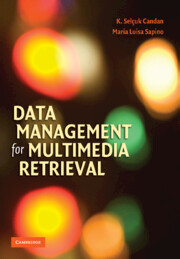Book contents
- Frontmatter
- Contents
- Preface
- 1 Introduction: Multimedia Applications and Data Management Requirements
- 2 Models for Multimedia Data
- 3 Common Representations of Multimedia Features
- 4 Feature Quality and Independence: Why and How?
- 5 Indexing, Search, and Retrieval of Sequences
- 6 Indexing, Search, and Retrieval of Graphs and Trees
- 7 Indexing, Search, and Retrieval of Vectors
- 8 Clustering Techniques
- 9 Classification
- 10 Ranked Retrieval
- 11 Evaluation of Retrieval
- 12 User Relevance Feedback and Collaborative Filtering
- Bibliography
- Index
- Plate section
10 - Ranked Retrieval
Published online by Cambridge University Press: 05 July 2014
- Frontmatter
- Contents
- Preface
- 1 Introduction: Multimedia Applications and Data Management Requirements
- 2 Models for Multimedia Data
- 3 Common Representations of Multimedia Features
- 4 Feature Quality and Independence: Why and How?
- 5 Indexing, Search, and Retrieval of Sequences
- 6 Indexing, Search, and Retrieval of Graphs and Trees
- 7 Indexing, Search, and Retrieval of Vectors
- 8 Clustering Techniques
- 9 Classification
- 10 Ranked Retrieval
- 11 Evaluation of Retrieval
- 12 User Relevance Feedback and Collaborative Filtering
- Bibliography
- Index
- Plate section
Summary
Ranked query processing is important in many application domains, including information retrieval and multimedia, where results presented to the user need to be ordered based on their scores of matching.
As discussed in earlier chapters, fuzziness is inherent in multimedia retrieval for many reasons, including similarity of features, imperfections in the feature extraction algorithms, imperfections in the query formulation methods, partial match requirements, and imperfections in the available index structures. Data (whether captured in real time through sensory measurements or processed, materialized, and stored for later use) are many times accurate only within a margin of error. Also, in many cases the importance of a feature depends on how dominant it is in a particular data object and how discriminatory/rare the feature is in the entire data collection. The popular term frequency/inverse document frequency (TF-IDF) keyword weights (Section 4.2) used in text retrieval rely on this principle. The importance of the feature can also reflect the retrieval context. For example, a keyword, say, “entropy,” may carry different meanings and relevance and imply different semantic similarity relationships when used within a computer science context versus within its physics context. Thus, in many applications, the utility of a data element to a particular retrieval task depends on the user's query and the usage context. Consequently, users are usually not interested in obtaining all possible matches to a query, but only the k best results, where k is application specific or provided by the user.
- Type
- Chapter
- Information
- Data Management for Multimedia Retrieval , pp. 327 - 379Publisher: Cambridge University PressPrint publication year: 2010

